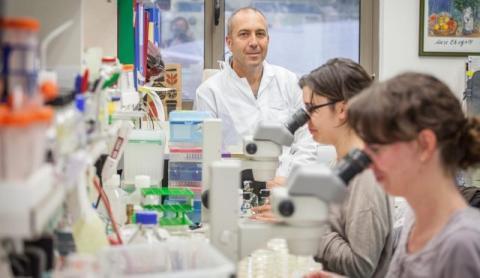Israeli scientists discover substance that may fend off Alzheimer's, aging
Most degenerative brain diseases that appear randomly are diagnosed during the seventh decade of life, while even patients with familial mutations that predispose them to these diseases do not show symptoms before their fifth decade. Thus one of the central questions in the study of dementia diseases is why these illnesses don’t present themselves at younger ages.
Cohen notes that the ability to extend the lifespan of simple organisms like worms and mice by inhibiting aging factors has been known since the 1990s. “What we examined in our study did not touch directly on extending life expectancy. We tried to test whether slowing the aging process by inhibiting the insulin/IGF signaling pathway can protect against the toxic proteins that cause human neurodegenerative diseases.”
Over the years, Cohen’s teams have discovered that inhibiting the insulin/IGF signaling pathway protects the worms from a toxic protein associated with Alzheimer’s disease, and that inhibiting this pathway also protects mice from behavioral disorders and the pathological symptoms of a disease that resembles Alzheimer’s. Reports on this research appeared in the prestigious journals Science and Cell.
But in these studies the pathways were inhibited through genetic manipulation, a method that cannot be used on humans. Thus, there developed a need to find a drug with the same effect that could have therapeutic use in humans. In 2012, Cohen won a European Research Council grant to continue his research which focused on finding a pharmacological solution for these diseases.
The team began examining the use of NT219, a family of the insulin/IGF pathway inhibitors developed by biomedical startup Tirnovo and Prof. Alexander Levitsky and his team at the Department of Biological Chemistry at Hebrew University. The material was being developed to treat certain types of cancer. “They are using the materials for their objectives, but we are collaborating with them to see if we can use the material to selectively delay aging and if this delay can protect against diseases such as Alzheimer’s and Parkinson’s,” Cohen said.
Although this is only an initial study, it could be very significant. It is the first time a decrease in protein toxicity has been achieved using pharmacological tools that could theoretically be used on humans, the researchers maintain. But Cohen cautioned: “The road from worms to humans is a long one. We recently got the go-ahead to proceed with a study on mice that will start in a few weeks.” Nonetheless, he is optimistic. “At this point, it looks like a promising step in a totally new direction, in which research has been done in the field for less than a decade,” he said.
Ido Efrati

